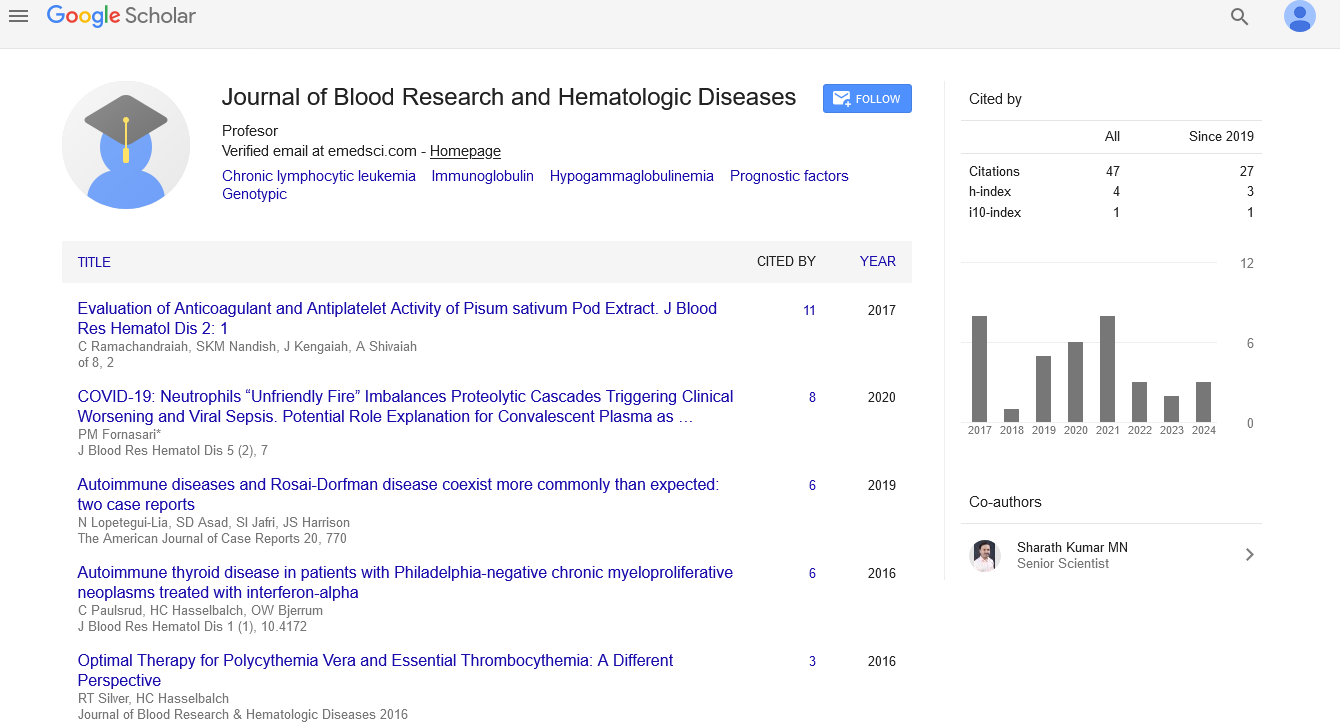Perspective, J Blood Res Hematol Dis Vol: 7 Issue: 2
A Study of Obinutuzumab Alone and In Combination for Follicular Lymphoma
Arsic Milan*
Department of Surgical Education, Wroclaw Medical University, Wroclaw, Poland
*Corresponding Author: Arsic Milan
Department of Surgical Education, Wroclaw Medical University, Wroclaw, Poland
Email: arsicmilan@gmail.com
Received date: 01 March, 2022, Manuscript No. JBRHD-22-58925;
Editor assigned date: 07 March, 2022, Pre QC No. JBRHD-22-58925 (PQ);
Reviewed date: 14 March, 2022, QC No. JBRHD-22-58925;
Revised date: 24 March, 2022, Manuscript No: JBRHD-22-58925 (R);
Published date: 30 March, 2022, DOI:10.4172/jbrhd.1000150.
Citation: Milan A (2022) A Study of Obinutuzumab Alone and In Combination for Follicular Lymphoma. J Blood Res Hematol Dis 7:2
Keywords: Follicular Lymphoma
Introduction
The addition of rituximab (Genentech, Inc., South San Francisco, CA, USA) to chemo immunotherapy regimens has increased the survival of patients with Follicular Lymphoma (FL). However, similar treatments do not benefit all patients. According to recent research, patients who do not sustain a remission for 1-2 years, or 30 months have a much worse prognosis than those who do not have an incident. Patients with FL who relapse within two years of treatment had a 50% 5-year overall survival rate, compared to 90% for patients who do not relapse early. Despite this, the condition is deemed incurable in the majority of cases. Multiple relapses are common, and patients eventually develop resistance to treatment, which generally includes rituximab. Reduced cellular penetration, impaired rituximab binding (via FcRIII polymorphisms), downregulation of CD20, increased rituximab metabolism, resistance of tumour cells to rituximab-effector mechanisms, impaired immune effector cell recruitment or function, complement depletion, and downregulation of proapoptotic proteins have all been proposed as mechanisms of rituximab resistance. The poor prognosis of rituximab-refractory patients has prompted researchers to look for new effective treatments, such as Monoclonal Antibodies (mAbs). An antibody must be more active than rituximab, efficacious in the situation of rituximab resistance, or prolong survival when administered as maintenance to gain a place in current treatments. Type I MAbs (such as rituximab, ofatumumab [Novartis Pharmaceuticals Corporation, East Hanover, NJ, USA], veltuzumab [Immunomedics, Inc., Morris Plains, NJ, USA], and ublituximab [TG Therapeutics, Inc., New York, NY, USA]) and type II MAbs (such as ublituximab [TG Therapeutics, Inc (i.e., obinutuzumab [Genentech, Inc.] and tositumomab [GlaxoSmithKline LLC., Wilmington, DE, USA]). Type I antibodies cause CD20 to be translocated into vast lipid rafts within the plasma membrane upon binding, whereas type II antibodies do not. This event increases complement activation, resulting in strong complement-dependent cytotoxicity (CDC) in type I antibodies and modest CDC induction in type II antibodies. Internalization of the CD20 antibody complex following rituximab binding reduces effector cell recruitment and antibody half-life, whereas CD20 internalisation is negligible in type II mAbs. Type II antibodies bind to half as many B cells as type I mAbs. The biological ramifications of this discovery are currently unknown. Anti-CD20-directed mAbs of the second generation have also been produced. Of a tumumab is a type I mAb that has a higher CDC than rituximab and detaches from CD20 more slowly. It was licensed for the first time in patients with Chronic Lymphocytic Leukaemia (CLL) who had failed to respond to alemtuzumab and fludarabine (Ben Venue Laboratories, Bedford, OH, USA). In rituximab-refractory FL, ofatumumab showed minimal single-agent efficacy. Rosenbaum et al randomised 51 patients with untreated FL to either 500 mg (n=15) or 1000 mg (n=36) four weekly doses of ofatumumab, followed by an extended induction phase with four additional doses of ofatumumab every eight weeks in a randomised, multicenter Phase II research.
The Overall Response Rate (ORR) was 86.7 % in the 1000 mg arm and 60% in the 500 mg arm, indicating a dose–response effect. Tumumab has not been studied thoroughly in this scenario since it appears to cause more Infusion-Related Events (IRRs) and neutropenia than rituximab. In vitro tests of CLL cell lines, ubituximab, a type I glycoengineered anti-CD20 recombinant mAb, showed considerably improved Antibody-Dependent, Cell-Mediated Cytotoxicity (ADCC) compared to rituximab. In a Phase I/II trial, this mAb was tested in 35 patients with B-cell non-Hodgkin lymphoma (NHL; FL: 12 patients) and CLL (8) who had previously had rituximab treatment.
The ORR in the FL cohort was 42% (two Complete Responses [CRs] and three Partial Responses [PRs]). All patients experienced one or more Adverse Events (AEs), with 40% experiencing IRR and 49% experiencing at least one grade 3–4 AE. Several clinical trials using ublituximab alone or in conjunction with other drugs are now underway. Veltuzumab, a second-generation humanised anti-CD20 mAb that operates in vitro similarly to rituximab but contains a framework region that differs from rituximab, is no longer being developed.In 82 patients with relapsed, refractory FL, Veltuzumab had a 44% objective response rate. PRO131921 is a humanised third-generation anti-CD20 antibody with a higher ADCC than rituximab. A 50% response rate was achieved in rituximab-refractory FL patients in a Phase I trial in relapsed or refractory CD-20-positive Indolent NHL (iNHL). In comparison to rituximab, the designed humanised IgG1 mAb against CD20 AME-133v (Mentrik Biotech, LLC, Dallas, TX, USA) showed higher preclinical ADCC activity. In a Phase I study of 23 previously treated FL patients, (9%) had CRs and (3%) had PRs (13%).
 Spanish
Spanish  Chinese
Chinese  Russian
Russian  German
German  French
French  Japanese
Japanese  Portuguese
Portuguese  Hindi
Hindi 